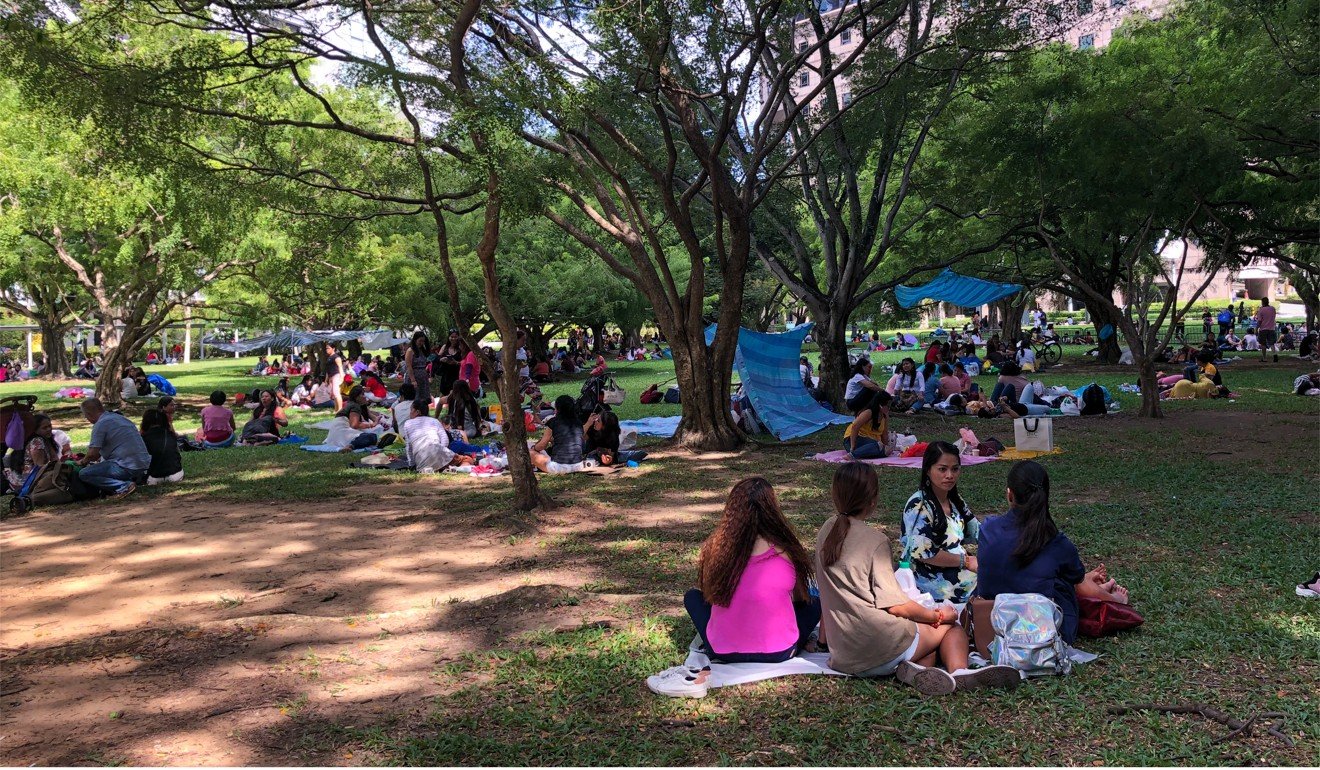
Singapore’s migrant workers just want a safe space to gather on their day off
- A crash at Lucky Plaza, in which two Filipino domestic workers sitting on the pavement were killed, has highlighted the lack of social spaces
- These workers, who make roughly S$700 (US$518) a month and send the bulk of it home, cannot afford to sit in cafes where a cup of coffee costs S$6 (US$4)

After working six days a week from dawn to dusk – preparing meals, cleaning, making sure her employers’ children get to school and finish their homework – all Sofia Marsudin, 49, wants to do on a Sunday is to meet her friends for some food and relaxation. Preferably at a park that has shade, affordable food nearby, toilets, and amenities the Indonesian domestic worker needs, such as remittance services so she can send money home to her daughter and ageing parents.
But there is no such place in Singapore, where she has worked for 15 years. Instead, she goes to Lucky Plaza along Orchard Road on Sundays to remit money, then sits on a grassy patch one train stop away at Somerset with her friends.
They bring a picnic mat and food they have prepared, walking to a nearby mall when they need to use the restroom or for some respite from the heat, leaving one or two friends behind to jaga (Bahasa Indonesian for watch) their belongings. If it rains, they will take a bus to the airport and jalan jalan (walk around).

These workers, who make roughly S$700 (US$518) a month and send the bulk of it home, cannot afford to sit in cafes where a cup of coffee costs S$6 (US$4), so many have taken to sitting on pavements. Which was what a group of six Filipino women did on December 29 when a car lost control and crashed into them, killing two and sending four to hospital.
The accident could have happened to any pedestrian shopping at Orchard Road that day, but Filipino construction worker Johnwil Saladar, 35, who was at the scene of the accident, now worries about safety.
“It is our fault for sitting next to the road,” he said. So just last Sunday, his group of eight friends clustered under bushes next to a bench instead, shielded from the main road by the hedges as they nibbled on Filipino snacks and drank Anchor beer from plastic cups under the blazing tropical sun.
“It is hot but still better than Lucky Plaza which is crowded,” Saladar said.
These spaces can get crowded as the city state now has 255,800 foreign domestic workers – a 27 per cent spike from 2010 – and six in 10 get a regular day off on Sunday. Marsudin said the grass patch she hangs out at has become more crowded through the years.
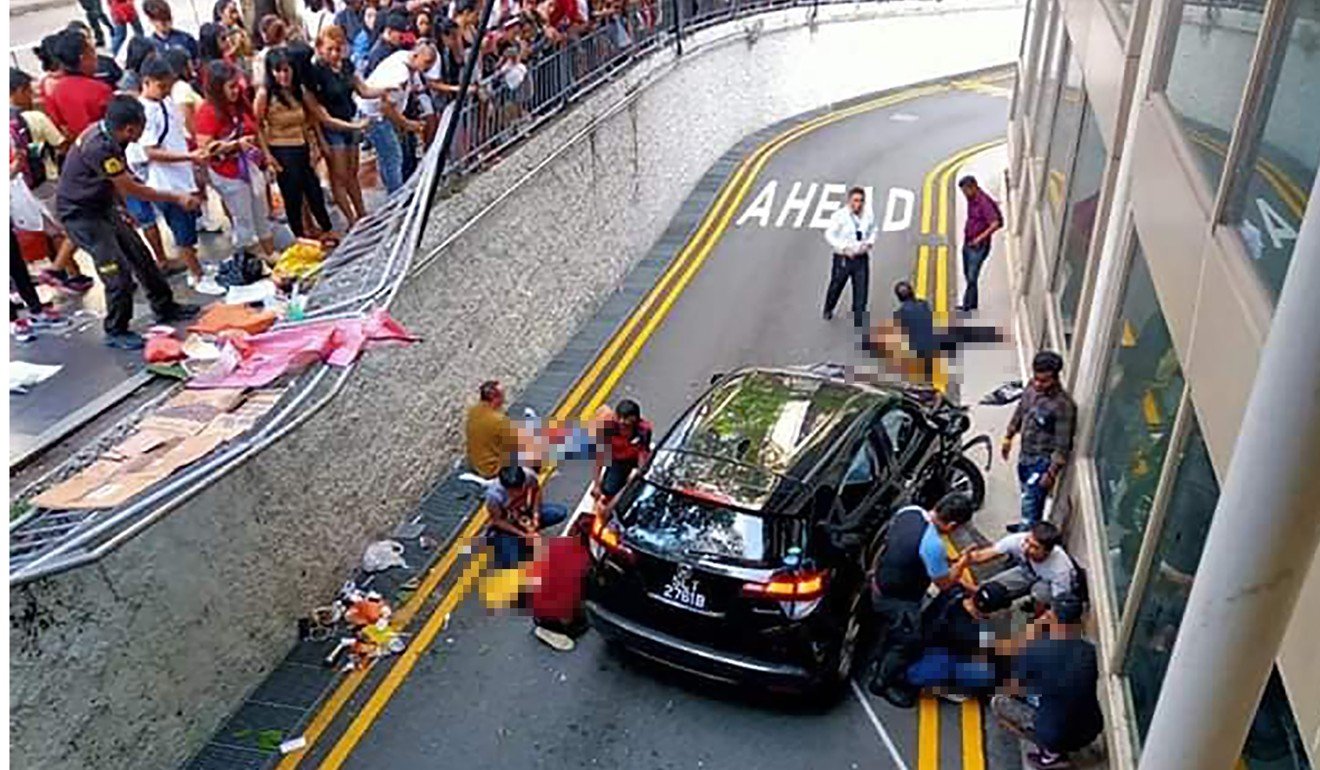
At Lucky Plaza, mall management said the Sunday crowd can swell to 10,000, creating a safety threat when fire escapes, walkways and escalators are blocked. Domestic helpers said security guards make rounds, telling them not to sit on the floor inside the mall. “He will say, ‘Up, up, up!’ Then when he goes we sit back down,” said Jenalyn Reyes, 36.
There are big parks the foreign workers can head to, such as Singapore Botanic Gardens or Toa Payoh Park, which Resa Lavylyn Peraz, 35, said is “big and has a lot of shade”. But Peraz and her friends reserve that for special occasions like a birthday, because travelling there takes precious time and money. It is easier for her to meet her friends near Lucky Plaza as not all of them get the same hours off. Peraz herself gets to leave home at 9am but has to be back by 5.30pm.
And while the train fare from Peninsula Plaza to Toa Payoh Park is just S$1.22 (90 US cents) per adult, workers like Zozoi, 34, and her husband still penny pinch as they try to keep their combined monthly expenses to between S$100 and S$150 (US$74 to 110).
After attending church nearby and getting lunch at the mall, the Burmese couple also spend the rest of the day on a pavement. “Sometimes we go to Sentosa to take photos, but in one year just one or two times, because it is expensive,” she said.
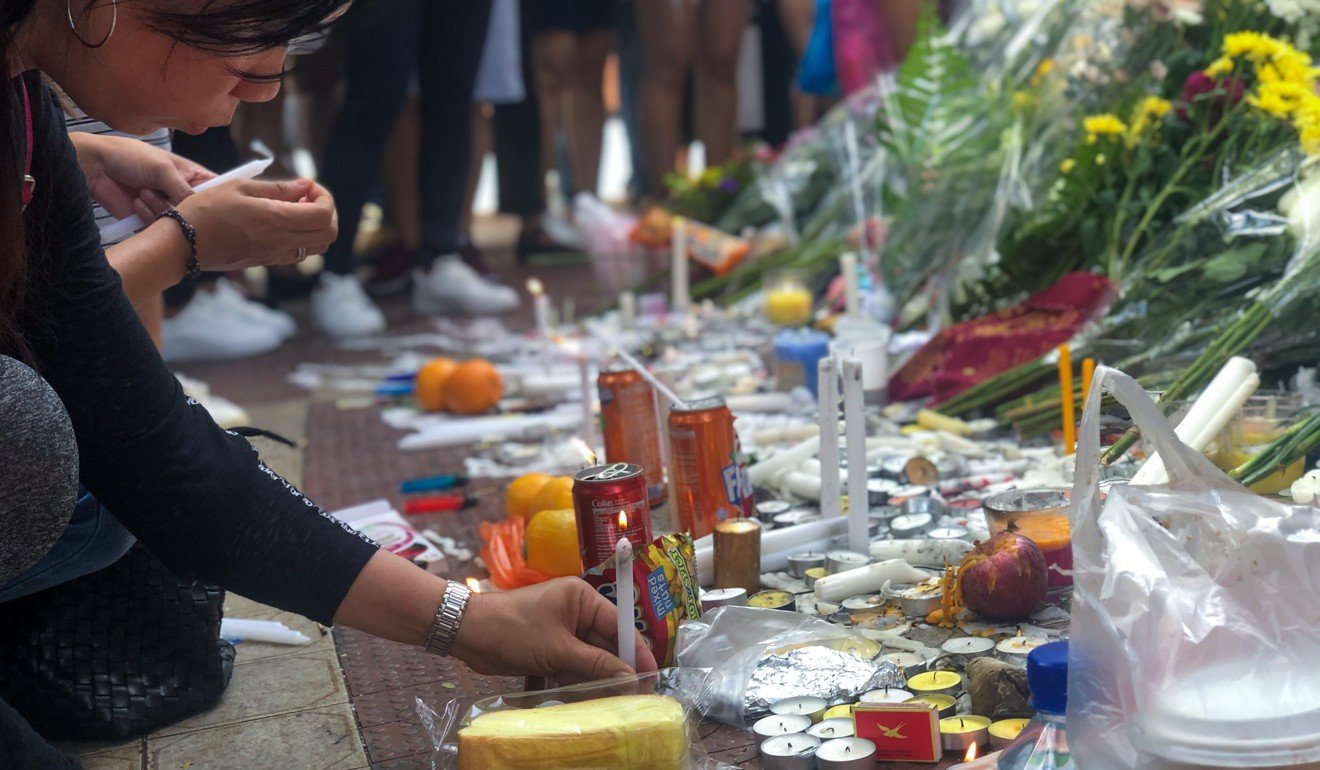
Non-profit organisations working with migrant workers say the lack of space is clear, but they are in a quandary on how to fix it. Creating spaces designated for this population means further demarcating low-wage foreign workers from Singapore society.
“To restrict foreigners to certain places will run the risk of promoting social exclusion and marginalisation that implicitly suggests that foreigners as ‘the other’ who should not be seen and heard in public spaces,” said Yeo Guat Kwang, chairman of the Centre for Domestic Employees.
People are naturally drawn to spaces that are meaningful to them and will unsurprisingly attempt to occupy these spaces to create a sense of community identity.
However, this is not always the case. Erlie Ochoco, 36, who was taking photographs of the Lunar New Year decorations with her friends in the upscale mall Paragon Shopping Centre, said she felt no such discrimination and Singaporeans have been kind to her.
John Gee, executive committee member at Transient Workers Count Too (TWC2), said designated migrant worker spaces “always feel like something that is done to meet the complaints of some Singaporeans rather than out of genuine concern for migrant workers”.
Such designated spaces mushroomed after December 2013, when Indian foreign workers rioted after a worker was killed by a bus. The incident shocked Singaporeans, who have not seen such disorder since the race riots of 1964, in which 36 people were killed and 560 injured in clashes between Chinese and Malay communities, resulting in Singapore’s fundamental principles of multiculturalism and multiracialism once it gained independence from Malaysia a year later.
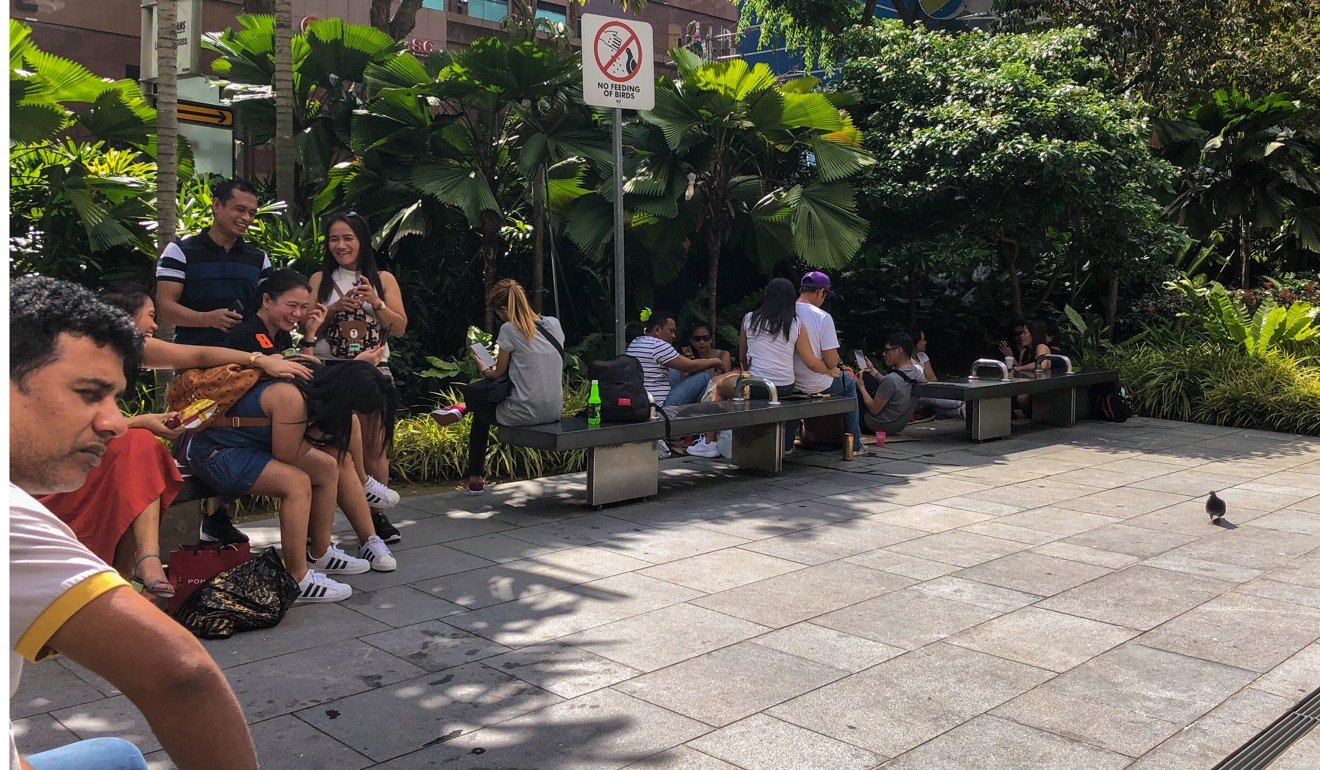
In response to the 2013 riots, recreation centres near workers’ dormitories were quickly set up, with the amenities they need – groceries, mobile phones, banking, remittance and sporting facilities – so they would not have to congregate at Little India.
Still, the recreation centres can never replace popular congregation places, said Yeo, who also chairs the Migrant Workers’ Centre, which operates one of the seven such centres. “Space” is strongly tied to the concept of social identity, he said. “People are naturally drawn to spaces that are meaningful to them and will unsurprisingly attempt to occupy these spaces to create a sense of community identity, especially when they reside in foreign countries.”
Jaya Anil Kumar, a case worker at Humanitarian Organisation for Migration Economics (HOME), said it is important for these workers to spend their days off at places with a sense of familiarity to ward off homesickness.
Instead of isolating these communities in far flung centres, experts suggest building conducive spaces near where the workers already congregate. Kumar suggested clubhouses built near the malls, Gee is in favour of closing off parts of Orchard Road to cars so locals and migrant workers both benefit. “For the low-waged of all backgrounds, free access and low cost food and drinks are important considerations,” he said.
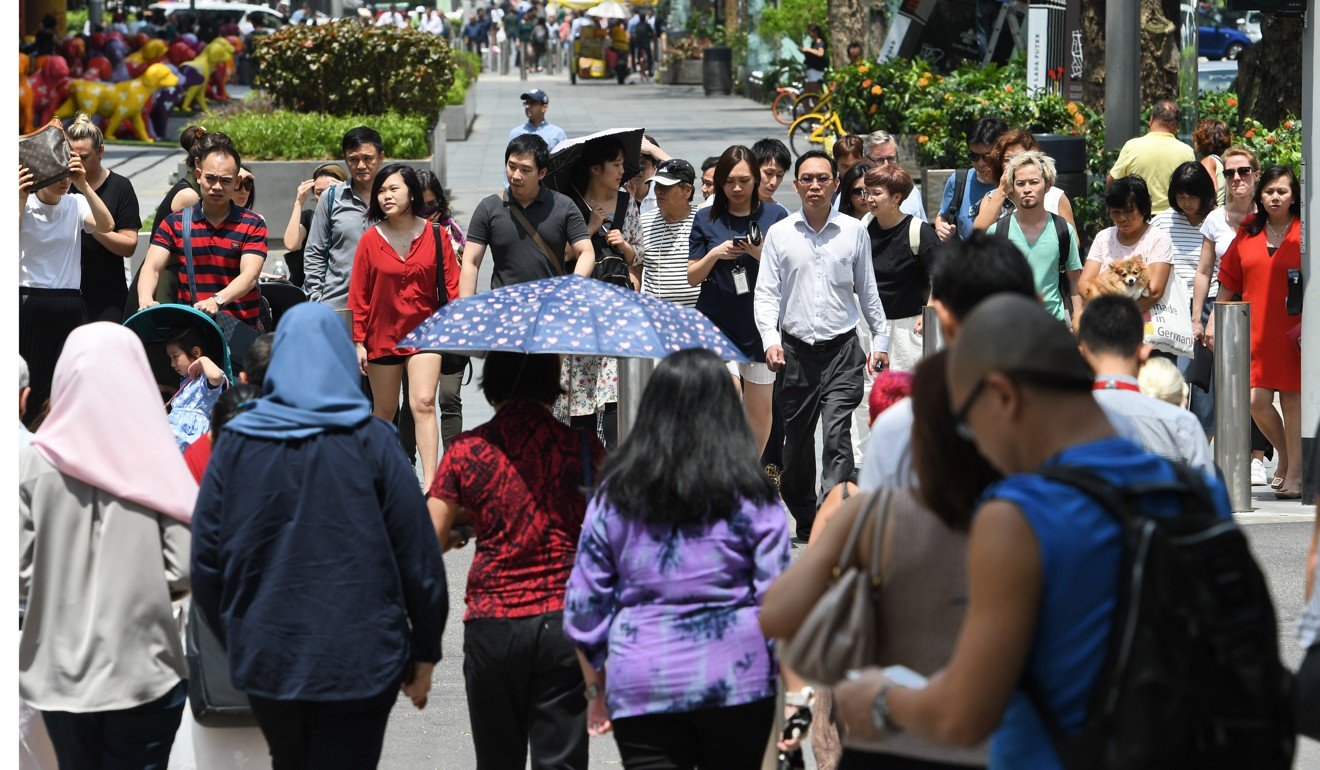
The Centre for Domestic Employees has opened offices at three malls so domestic workers can socialise in the space, with free activities, programmes and Wi-fi. They have also tied up with a local museum so that their members can enter for free.
For Saladar and his group of friends, an ideal space would be to convert the rooftop of Lucky Plaza into a park. “A comfortable place that we can hang out at after we send money home and buy our own food. It is easy to meet all the Filipinos here and have a small party here. We don’t need to do anything, just sit and talk and de-stress.”